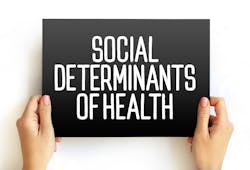A research study led by Kaiser Permanente’s Social Needs Network for Evaluation and Translation (SONNET) found that nearly half of study participants had at least one social risk. Of those who reported one or two social risks, only 27 percent desired assistance from the health system compared with 51 percent of those with three or four social risks.
Primary care teams are increasingly called upon to assist patients who have unmet social risks, such as unstable housing, food, transportation, and money for utilities. The study, "Social Risk Factors and Desire for Assistance Among Patients Receiving Subsidized Health Care Insurance in a US-based Integrated Delivery System,” published in Annals of Family Medicine, sheds light on the prevalence of social risks faced by many Americans — and looks at whether patients want help from their healthcare organization to address these risks.
Lead author is Leah Tuzzio, M.P.H., a senior research associate at Kaiser Permanente Washington Health Research Institute (KPWHRI), which is the home of SONNET’s Coordinating Center. “We hope these results inspire health care organizations and researchers to co-design patient-centered interventions to overcome issues such as stigma, especially as social health screening is elevated as a HEDIS metric,” she said in a statement.
To find out more about patients’ social risks and their interest in receiving help from their healthcare organization, Tuzzio and colleagues looked at data from a quality improvement survey led by SONNET that included questions about social risks, desire for assistance, attitudes about healthcare, and health outcomes. The survey was administered in English and Spanish for adult Kaiser Permanente members in Southern California who received federal health insurance subsidies through the California health care insurance exchange.
Among the study’s main findings:
• 48 percent of participants reported one or more social risks. The most common was housing insecurity and quality, with 70 percent reporting this challenge.
• People with social risks were twice as likely to report their health as "fair" or "poor" — even though they were similar in race, ethnicity, and other demographic features to people who did not have social risks.
• Although 90 percent of participants believed that health systems should assist patients with social risk factors, 14 percent who reported having social risks also reported more discomfort being screened for social risks than the 5 percent who reported no risks.
Based on these findings, the authors suggest that health organizations consider training clinicians in exploring unconscious bias and consider system-level culture change as screening for social health becomes more prevalent. Among the future research they recommend are assessments of the actual uptake of assistance with social risks and more studies focused on patients' desire for help to tailor interventions.
“Health systems should work to increase the comfort of patients in reporting risks, explore how to successfully assist them when desired, and offer resources to address these risks outside the healthcare sector,” said co-author Cara Lewis, Ph.D., SONNET co-director and KPWHRI senior investigator, in a statement.


